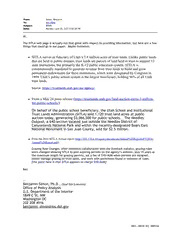
2019 01 Release Set 1 Doc 53 PDF
Preview 2019 01 Release Set 1 Doc 53
From: Simon, Benjamin To: Ann Miller Subject: BENM Date: Monday, June 05, 2017 4:40:58 PM Hi, The SITLA web page is actually not that great with respect to providing information, but here are a few things that could go in our paper. Maybe footnotes. SITLA serves as fiduciary of Utah’s 3.4 million acres of trust lands. Unlike public lands that are held in public domain, trust lands are parcels of land held in trust to support 12 state institutions, but primarily the K-12 public education system. SITLA is constitutionally mandated to generate revenue from trust lands to build and grow permanent endowments for these institutions, which were designated by Congress in 1894. Utah’s public school system is the largest beneficiary, holding 96% of all Utah trust lands. Source: https://trustlands.utah.gov/our-agency/ From a May 24 press release (https://trustlands.utah.gov/land-auction-earns-3-million- for-public-schools/) On behalf of the public school beneficiary, the Utah School and Institutional Trust Lands Administration (SITLA) sold 1,120 trust land acres at public auction today, generating $3,066,500 for public schools. The Needles Outpost, a 640-section located just outside the Needles District of Canyonlands National Park and within the recently-designated Bears Ears National Monument in San Juan County, sold for $2.5 million. From the 2016 SITLA Annual report (http://168.178.6.48/agencydocuments/Annual%20Reports/FY2016- Annual%20Report.pdf): Grazing Rule Changes: After extensive collaboration with the livestock industry, grazing rules were changed allowing SITLA to post expiring permits on the agency’s website, levy 15 years as the maximum length for grazing permits, set a fee of $10/AUM when permits are assigned, better manage grazing on trust lands, and work with permittees found in violation of rules. [the point here is that SITLA appears to charge $10/AUM] Ben -- Benjamin Simon, Ph.D., Chief DOI Economist Office of Policy Analysis U.S. Department of the Interior 1849 C St. NW Washington DC 202 208 4916 benjamin [email protected] DOI-2019-01 00554
